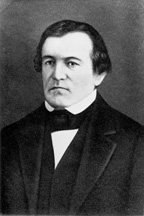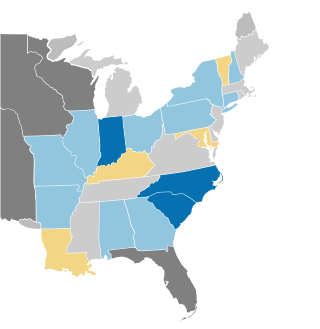Related Research Articles

The 1836 United States presidential election was the 13th quadrennial presidential election, held from Thursday, November 3 to Wednesday, December 7, 1836. In the third consecutive election victory for the Democratic Party, incumbent Vice President Martin Van Buren defeated four candidates fielded by the nascent Whig Party.

The 1852 United States presidential election was the 17th quadrennial presidential election, held on Tuesday, November 2, 1852. Democrat Franklin Pierce defeated Whig nominee General Winfield Scott. A third party candidate from the Free Soil party, John P. Hale, also ran and came in third place, but got no electoral votes.

The Constitutional Union Party was a United States political party active during the 1860 elections. It consisted of conservative former Whigs, largely from the Southern United States, who wanted to avoid secession over the slavery issue and refused to join either the Republican Party or the Democratic Party. The Constitutional Union Party campaigned on a simple platform "to recognize no political principle other than the Constitution of the country, the Union of the states, and the Enforcement of the Laws".

John Bell was an American politician, attorney, and planter who was a candidate for President of the United States in the election of 1860.

James Chamberlain Jones was an American politician who served as the tenth governor of Tennessee from 1841 to 1845, and as a United States Senator from Tennessee from 1851 to 1857. A Whig, Jones twice defeated future U.S. President James K. Polk for the governorship, in 1841 and 1843. He was the first native-born Tennessean to be elected governor of the state.

Isham Green Harris was an American and Confederate politician who served as the 16th governor of Tennessee from 1857 to 1862, and as a U.S. senator from 1877 until his death. He was the state's first governor from West Tennessee. A pivotal figure in the state's history, Harris was considered by his contemporaries the person most responsible for leading Tennessee out of the Union and aligning it with the Confederacy during the Civil War.

Spencer Jarnagin was a United States Senator from Tennessee from 1843 to 1847.

The 1842–43 United States House of Representatives elections were held on various dates in various states between August 1, 1842, and November 8, 1843. Each state set its own date for its elections to the House of Representatives before the first session of the 28th United States Congress convened on December 4, 1843. The exception was Maryland, who held theirs so late that they ran into February 1844. These elections occurred during President John Tyler's term. The congressional reapportionment based on the 1840 United States census unusually decreased the number of House seats, from 242 down to 223.

The Tennessee Democratic Party (TNDP) is the affiliate of the Democratic Party in Tennessee. The party was founded in 1826 initially as the Jacksonian Party. The Tennessee Democratic Party was born out of President Andrew Jackson's populist philosophy of Jacksonian democracy in the mid to late-1820s. After Jackson left office, the Democratic Party struggled in the state as the Whig Party would go on to be the dominate party in Tennessee until its collapse after the 1852 Election. Prior to the Civil War, as a result of the collapse of the former Whig Party, the Democratic Party became the dominate party in the state. After the war ended, the Republican Party would be the dominate political party during Reconstruction, but once Reconstruction ended, the Democratic Party would dominate Tennessee Politics up until 2011 when the Republican Party would gain firm control of Tennessee State Government.

The 1837 United States Senate election in New York was held on February 7, 1837, by the New York State Legislature to elect a U.S. Senator to represent the State of New York in the United States Senate.

The 1843 United States Senate election in New York was held on February 7, 1843, by the New York State Legislature to elect a U.S. Senator to represent the State of New York in the United States Senate.

The 1845 United States Senate special election in New York was held on January 18, 1845 by the New York State Legislature to elect two U.S. Senators to represent the State of New York in the United States Senate. The regular 1845 United States Senate election in New York was held on February 4, 1845, to elect a U.S. Senator to represent the State of New York in the United States Senate.

The 1852–53 United States Senate elections were held on various dates in various states, coinciding with the 1852 presidential election. As these U.S. Senate elections were prior to the ratification of the Seventeenth Amendment in 1913, senators were chosen by state legislatures. Senators were elected over a wide range of time throughout 1852 and 1853, and a seat may have been filled months late or remained vacant due to legislative deadlock. In these elections, terms were up for the senators in Class 2.

The 1842–43 United States Senate elections were held on various dates in various states. As these U.S. Senate elections were prior to the ratification of the Seventeenth Amendment in 1913, senators were chosen by state legislatures. Senators were elected over a wide range of time throughout 1842 and 1843, and a seat may have been filled months late or remained vacant due to legislative deadlock. In these elections, terms were up for the senators in Class 3.

The 1840–41 United States Senate elections were held on various dates in various states. As these U.S. Senate elections were prior to the ratification of the Seventeenth Amendment in 1913, senators were chosen by state legislatures. Senators were elected over a wide range of time throughout 1840 and 1841, and a seat may have been filled months late or remained vacant due to legislative deadlock. In these elections, terms were up for the senators in Class 2.

The 1838–39 United States Senate elections were held on various dates in various states. As these U.S. Senate elections were prior to the ratification of the Seventeenth Amendment in 1913, senators were chosen by state legislatures. Senators were elected over a wide range of time throughout 1838 and 1839, and a seat may have been filled months late or remained vacant due to legislative deadlock. In these elections, terms were up for the senators in Class 1.

The 1836–37 United States Senate elections were held on various dates in various states. As these U.S. Senate elections were prior to the ratification of the Seventeenth Amendment in 1913, senators were chosen by state legislatures. Senators were elected over a wide range of time throughout 1836 and 1837, and a seat may have been filled months late or remained vacant due to legislative deadlock. In these elections, terms were up for the senators in Class 3.

John Netherland was an American attorney and politician, active primarily in mid-19th century Tennessee. A leader of the state's Whigs, he served in both the Tennessee Senate and Tennessee House of Representatives, and was an unsuccessful candidate for governor on the Opposition ticket in 1859. During the Civil War, he supported the Union, and was a delegate to the 1861 East Tennessee Convention.

The 1836 United States presidential election in Tennessee took place between November 3 and December 7, 1836, as part of the 1836 United States presidential election. Voters chose 15 representatives, or electors, to the Electoral College, who voted for President and Vice President.
In 1841, Spencer Jarnagin was nominated for U.S. Senator by the Whig caucus in the Tennessee General Assembly. However, some of the Democrats in the legislature decided that no senator would be preferable to a Whig. Known as the "Immortal Thirteen" by Tennessee Democrats, they refused to allow a quorum on the issue.
References
- ↑ Bergeron, Paul H. (June 1963). "The Election of 1843: A Whig Triumph in Tennessee". Tennessee Historical Quarterly . 22 (2): 123–136. JSTOR 42621623.